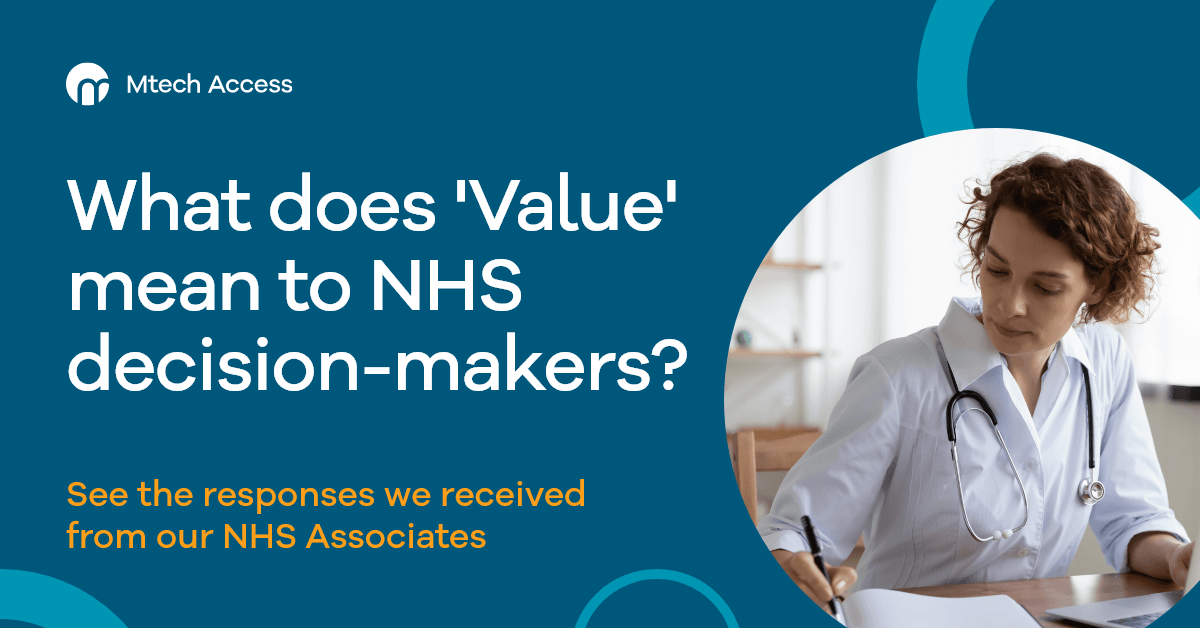
What do your NHS customers value in a treatment or technology? What drives their decision-making? And what do they want to hear from Pharma and Medtech?
Understanding NHS customers, the challenges they face and what drives their decisions is key to developing a successful UK market access strategy and value proposition.
Here we share some of the comments we received from our NHS Associates when we asked them:
- What does value mean to you in your role?
- What would you need to hear from industry to make you sit up, listen and want to do something?
Why did we ask?
On the 29th September 2022 we welcomed market access professionals from a wide range of Pharma and Medtech companies to our live NHS Engagement Symposium. Held at the Royal College of Surgeons, the event featured 9 guest speakers from our network of NHS Associates. They participated in panel discussions and interviews, and delivered presentations to share their insights, experience and perspectives with our audience.
In one session, entitled ‘The changing face of value propositions – what do new decision-makers need to hear?’, Karen Cooper (Senior Consultant – NHS Insight & Interaction) put the above questions to a panel of NHS decision-makers. In preparation for this session, and to get an even broader range of perspectives, Karen invited our network of 90+NHS Associates to share their thoughts via a survey.
Below are some of the responses we received.
What does ‘value’ mean to you?
GP Partner:
Value means a cost-effective proposition, tackling health inequalities.
Programme Director:
I consider, how can it improve quality of care, experience or health and wellbeing outcomes? How can it improve workforce experience or ways of working? How can it support working differently, in an integrated way across a place or system?
Advanced Nurse Practitioner:
Practical solutions to real problems. To me, value means patient involvement throughout service development. It also means promoting self-care wherever possible.
Programme Manager:
To me, value can come in many guises, but one way I like to think of it is the utilisation of NHS staff and resources in a way that, at the very least doesn’t compromise on the quality of patient of care or experience, but ideally should enhance capacity and capabilities of a trust’s services.
Clinical Director:
Value means acknowledgement, impact
PCN Leader:
Something that makes a positive difference to my role and to patients
GP Partner:
Value = Quality divided by Cost
PCN Manager:
An interesting question and not one that is asked enough. Industry should consider what is valued by patients and staff. Value can be a unit of currency and a unit of community. Value All Lessons as Unique Experiences. Value is calculated as an end point, not a start point. Value should be measured as both qualitative and quantitative. Never assume value, always find a way to prove value. Cost is not an indicator of value; only output is a true measure. Failure has most value if you are prepared to look hard enough.
Advanced Nurse Practitioner:
People often say we value you but it’s not reflected in their actions. In my role at work, I guess things like inclusivity and respect of my opinion and experience, and what that brings to the team/workplace.
Trust Finance Lead:
Value in my role is about reducing cost in providing healthcare to a patient. This doesn’t have to be in a single health care setting, but real value must be linked to outcomes that are better than the presenting state. It is not about providing care for less than a fixed or arbitrary sum, but it is about ensuring that money is spent well, and with patients as the focus and not a particular organisation or clinician. Doing what is required, not necessarily what is immediately affordable.
Social Care Director:
Recognition that the expertise of social care providers are part of the solution to demand and system wide pressures. A key word is ‘kindness’… Indeed, core to our collective needs are 3 words: LEADERSHIP, CULTURE and LANGAUGE. The language issue is about respecting the fact that social care/care homes use different language to the medical model. Illness, disease, and treatment terminology are used in healthcare, we use it at times but are more about what matters to those we care for as much as what is the matter with them!!
Independent Consultant in Public Health:
Value is relative, not absolute: some interventions in healthcare offer better value than others. Value is determined by improved outcomes for a unit of input, not improved outputs for a unit of input. “Values” are important too, and don’t fit easily into a market model, except perhaps as markers of quality – e.g. being treated with empathy, cheerfulness, kindness, and all seven Nolan principles of managerial conduct in public life, like honesty and openness, etc. Clinical care is essentially a gift relationship, not a commercial transaction, and that is an important value to clinicians. All “priorities” are actually value statements.
Ages ago, when I worked on “programme budgeting and marginal analysis” (PBMA), I wrote a training manual for new commissioners called “commissioning for value”, where value meant maximising population health in a given programme with a given budget by incremental (marginal) shifts in resources between prevention, diagnosis, treatment, support and terminal care. There were no “right” answers for “value” – just openness about what the assumptions of better value were.
Commercial Director:
The environment we create together for our patients. The sense of achievement seeing our patients smile when they leave.
Practice Manager
Value means something that benefits patients AND makes life easier for practices; or benefits patients AND doesn’t add workload to practices; or benefits practices AND doesn’t detrimentally impact on patient health/experience.
Former Clinical Lead for Medicines Optimisation:
Value has many meanings and can depend upon one’s perspective… The NHS needs to place a value upon the care that it can offer, it’s offer of care cannot be limitless. The limit of this care should be defined clearly and understandably, and the comparative value of treatments should be explicit. This becomes apparent when commissioning a service or technology, but also should be part of the personalised discussions with a patient in order to achieve a shared decision of their management.

Head of Integrated Care:
Value for me is around delivering the best possible care within our constrained resources. At the moment the things that are most appealing are those that free up precious time for our teams given the workforce challenges we face.
Chief Nurse:
Value means the benefit afforded in comparison with the effort (resource utilisation) required.
What would you need to hear from industry to make you sit up, listen, and take action?
Programme Director:
Stories and evidence of where it has worked – what do the patients, service users and workforce using it have to say? How does it contribute to our overall vision and purpose? How can it help us save money, work more efficiently or maximise impact? If it requires investment, what is the return?
Clinical Director:
I would need to hear how it will benefit patients while not negatively impacting the existing workforce. I’m interested in creating effective coproduction and stabilising our workforce.
Primary Care Network Leader:
A solution to a problem I actually had.
GP Partner:
What would make me sit up and listen? Probably…redefining what the NHS is for. What can IT do better than clinicians? And decisions to treat being separated from the treatment process itself.
Advanced Nurse Practitioner:
Looking at the wider picture, NHS workers across the board feel like they are swimming against the tide and are always up against the shortages of resources, money, and time. People working under such conditions often feel under valued. So things that would make me sit up would be fair pay, training opportunities and time (more time for patients, more time to complete work and protected time to recharge). If we value our NHS we must value its workforce.
Trust Finance Lead:
Anything that’s spoken aloud is likely to make me sit up and listen. Anything that saves time is interesting, anything that can be done fewer times, or with less, or somewhere else, or with fewer people, or different people, or by the patient, or in the home, or digitally, or more successfully, or is preferred by the patient, or increases compliance to regimens, or is shorter, or is more sustainable, or extends periods between checks and follow ups.
Commercial Director:
I’m always inclined to move to action when I hear that IS providers are tarred with a way of privatising healthcare. I’m a socialist and always will be. The NHS is strangled by unnecessary red tape and bureaucracy, all of which wastes resources that should be spent on clinical care for patients. After 35 years in the NHS, I can say this with certainty. That really gets me going!
Head of Medicines Optimisation:
A medicine or product that has demonstrable benefits in helping our patients live better or longer lives at a cost that is affordable by the tax payer and the NHS.
Place GP Lead:
Be clear on the difference any change makes – what will be measurably different?
Practice Manager:
At the moment, anything that makes life easier for practices would be wonderful!
Chief Nurse:
I’d need to hear about impact for people to make me sit up and listen, particularly how impact could be focused on those in greatest need and those most disadvantaged.
Please note, responses have been edited for ease of reading and brevity.
To put your questions to our NHS Associates and gain insights for your UK market access strategy, email info@mtechaccess.co.uk.


